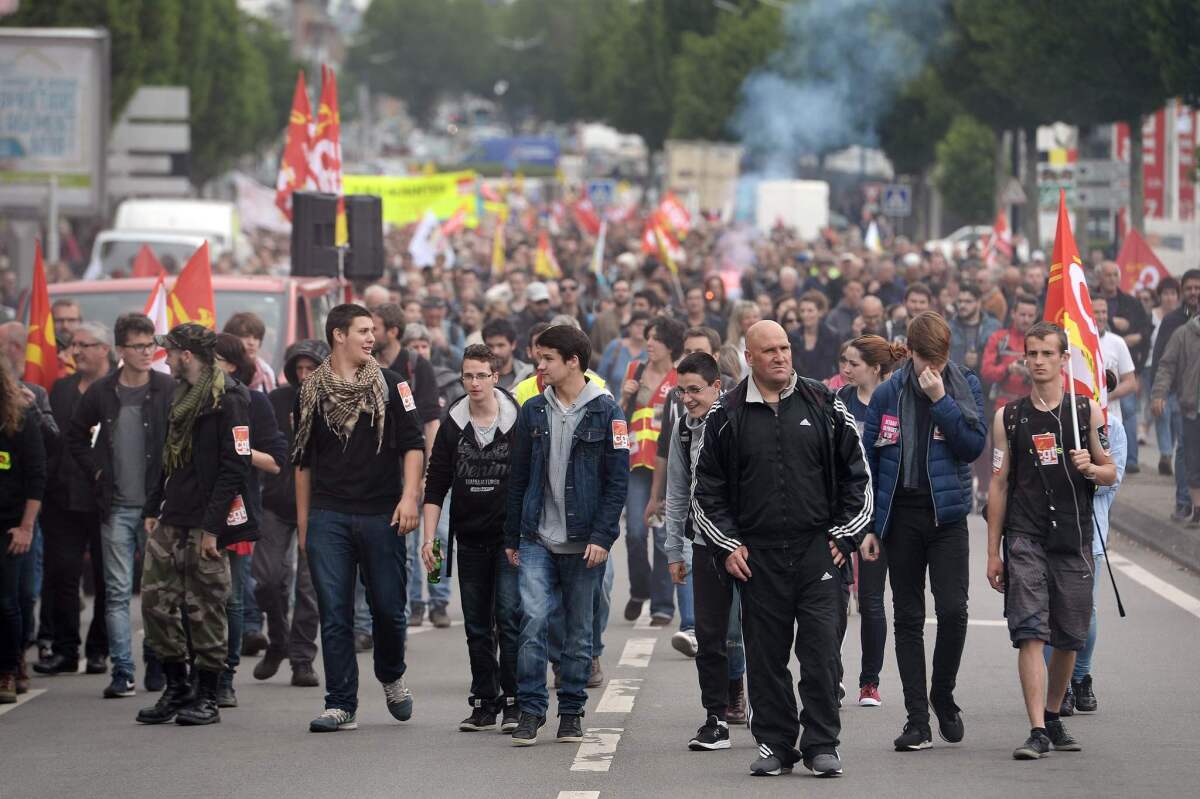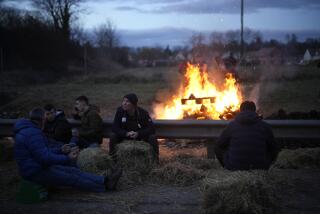France faces major challenge as activists step up protests over bill loosening labor protections

France’s deeply unpopular President Francois Hollande is facing the greatest challenge to his authority and that of his socialist government as widespread strikes threaten to paralyze the country.
Union activists have blocked oil refineries and fuel depots during the last week, forcing authorities to dip into gasoline reserves to avoid shortages at the pumps, as part of protests against a labor bill that would loosen protections for workers.
Already faced with economic stagnation and unemployment at about 10%, many of France’s workers have taken to the streets, at times resulting in violent clashes with authorities.
On Thursday, activists disrupted services involving nuclear power plants, public transportation, ports and roads.
As baton-wielding riot police fired tear gas into the crowds in central Paris, one woman escaping the melee said: “This government has a real problem.”
Thousands of protesting dock workers reportedly went to the public square in the French port city of Le Havre.
Police said about 150,000 people demonstrated across the country Thursday, while union activists said twice that number participated. Authorities said at least 77 people were arrested nationwide.
The actions are being led by the left-wing General Confederation of Labor (CGT) union, which wants France’s socialist government to scrap the labor bill. Provisions include making the country’s 35-hour work week less restrictive for employers.
CGT leader Philippe Martinez, who referred to the proposed law as a return to the 19th century, said either the government would listen to protesters and withdraw the bill or “the workers speak ... and the action continues.”
“As long as the government refuses to discuss this, there’s a risk that the mobilization will escalate,” he told journalists.
Officials say the bill seeks to boost hiring during tough economic times.
The International Monetary Fund says the reforms do not go far enough, but protesters claim it threatens workers’ rights and makes their position more precarious.
Faced with opposition to the bill from its own ranks, the government used emergency constitutional powers to push it through the lower house of parliament, the National Assembly, this month without a vote, which it would almost certainly have lost.
The bill will be debated by the second house, the Senate, next month. The right-wing majority is expected to attempt to reintroduce clauses the government dropped to appease the unions before a final reading in the National Assembly.
Prime Minister Manuel Valls said Thursday that there may be changes to the bill, but that it would not be withdrawn.
The CGT “doesn’t make the laws,” Valls said. “Blocking a whole country is unacceptable.”
At the heart of the dispute is a rejection by unions of hated “Anglo-Saxon capitalism,” seen by French workers as a threat to their hard-won social rights and privileges.
Political scientist Matthew Fraser, a professor at American University of Paris, said it is also a left-on-left battle; left-wing voters are bitterly disappointed with the socialist government’s free market and economically liberal leanings.
“The communist CGT union and its far left political allies are attacking a weakened Socialist Francois Hollande a year before the next presidential elections. The far left is hostile towards Hollande because he has taken a centrist approach to economy policy in the name of reform,” Fraser said in an interview.
Fraser said France has remained stuck in a rigid status quo for four decades because politicians have feared the consequences of taking on the unions.
“France is constantly paralyzed by strike actions because the work force enjoys tremendous entitlements and privileges – short work weeks, long holidays, security of employment, and other perks – and refuse to concede on tier privileges to allow outsiders to gain access to the workforce,” he said. “The system is centralized, hierarchical and rigid. There is no room for pragmatic compromise.”
ALSO
Romania continues an unlikely cinematic domination at Cannes
Several arrested after Trump supporters and opponents square off at rally in Anaheim
Condoms, tampons and feces: Oregon fraternity suspended after ‘disgraceful’ trashing of Shasta Lake
Willsher is a special correspondent.
UPDATES:
2:38 p.m.: This article was updated with Times reporting.
4:25 a.m.: Updated with additional details
This story was originally posted at 3:52 a.m.
More to Read
Start your day right
Sign up for Essential California for news, features and recommendations from the L.A. Times and beyond in your inbox six days a week.
You may occasionally receive promotional content from the Los Angeles Times.






